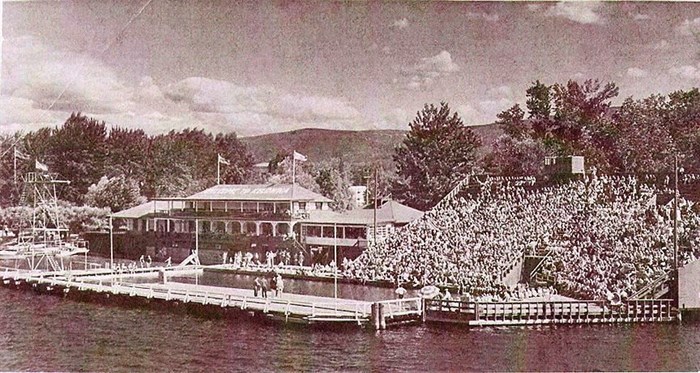
The Aquatic was a popular Kelowna landmark.
Image Credit: FACEBOOK/The new aquatic
September 12, 2020 - 3:00 PM
When Don Knox was growing up in Kelowna during the 1960s, the Aquatic on Okanagan Lake was the place to be.
"It was the focal point of the summer," Knox, an Okanagan historian, said Saturday, June 20, the official start of the region's busiest season — a time where longtime residents often lament the loss of the once-popular amenity.
The massive grandstand structure with a pool-like lake divider was built initially in 1909 and was a community focal point until it burned down in 1969. It and the facilities placed throughout city park, including the diving structure, were where children learned to swim, teens and adults gathered for concerts and dances and, eclipsing it all, it's where the regatta was held.
The regatta was billed as Canada's "greatest water show" and people would make their way to the Okanagan just to bask in some of the summertime fun it offered. And, key to its appeal was the Athans family, Knox said.
George Athans was a well-known doctor and won gold and silver medals in the springboard and tower events at the 1950 British Empire Games held in Aukland, New Zealand, as well as numerous Canadian diving championships. He’s also a member of the B.C. Sports Hall of Fame; the Canadian Sports Hall of Fame; and the Swimming Hall of Fame in Winnipeg. He used to co-headline the regatta show in the 1950s and '60s, putting on a diving act and a clown performance that was very popular.
His wife, Irene Athans, was a champion synchronized swimmer and that was another show that people loved.
There were also racing sculls and war canoes. Hot Sands beach would be where hydroplanes would take off and people would find a good place in the grandstand to watch.
"Everything was centred around there," he said. "It was the heart of summer."
Knox remembered how he and other teens would drive up Harvey Avenue to the A and W in Capri Mall, which was new, get a root beer and go back down Bernard Avenue, to the park.
"People would be out in the cars and waving and smiling and having a good time," Knox said.
"Kelowna wasn't a big place then. There was not much else going on, and the park was the focus to the city, it wasn't just the Aquatic."
Fellow historian Bob Hayes also believes that City Park was once the heart of the area, and ironically sees the development of places like the Capri Mall as the point where things really changed for the Aquatic and that area of the city, in general.
By the time it burned down in June 1969, the Aquatic was already less popular than it had been in its heyday.
"I think Kelowna was already changing," Hayes said. "Orchard Park was opening, there was the Capri area, and the focus was starting to shift from downtown Kelowna."
While some thought it may have been rebuilt after the fire, Hayes said there was a recognition that times were changing.
The city's growing population created the need for year-round recreational facilities and the money for its insurance was diverted to the creation of Parkinson Recreation Centre.
Also, the regatta wasn't what it once was.
"It was advertised as Canada's greatest water show, but it wasn't anymore," he said. "The regatta was winding down, and City Park was changing, then we had grandstands burned and there was a whole change. Kelowna was growing. "
The regatta had steered away from the war canoe races and synchro and other water events, to rides, arcades and a beer garden.
"The water aspect of things were changing," he said. "They had hydroplanes in an attempt to get the focus on the lake but I think things were changing. Kelowna was growing and the regatta wasn't a water show."
The nail in the coffin for that event was two back-to-back riots in the 80s, where people stormed Bernard Avenue. When the regatta was gone, the likelihood that anything like the Aquatic would return was truly over.
"There's a romanticism there — for people involved in water sports and diving, that was a huge part of their lives and the loss of the Aquatic was big."
But, it like so many things suffered from new realities.
Like the Flintstone Park, or the drive-ins, or campsites Hayes said, the land would be ridiculously expensive for amenities that are only open for a portion of the year.
That said, the one thing that has stayed the same is the allure of the lake.
"I don't think we can ever underestimate the role Okanagan Lake played in the development of the region," he said.
To contact a reporter for this story, email Kathy Michaels or call 250-718-0428 or email the editor. You can also submit photos, videos or news tips to the newsroom and be entered to win a monthly prize draw.
We welcome your comments and opinions on our stories but play nice. We won't censor or delete comments unless they contain off-topic statements or links, unnecessary vulgarity, false facts, spam or obviously fake profiles. If you have any concerns about what you see in comments, email the editor in the link above.
News from © iNFOnews, 2020